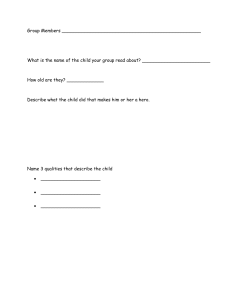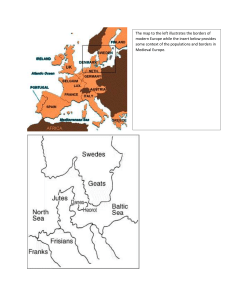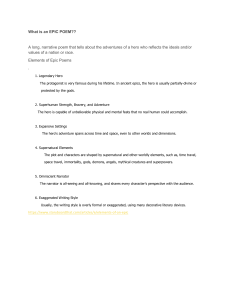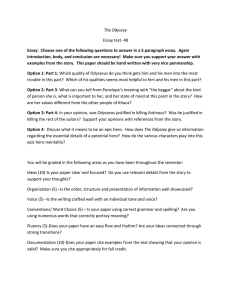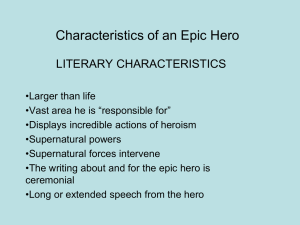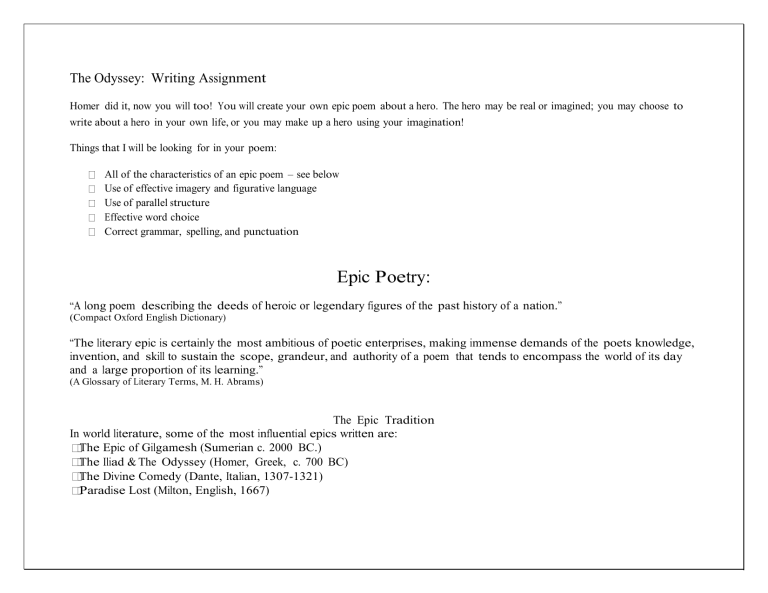
The Odyssey: Writing Assignment Homer did it, now you will too! You will create your own epic poem about a hero. The hero may be real or imagined; you may choose to write about a hero in your own life, or you may make up a hero using your imagination! Things that I will be looking for in your poem: All of the characteristics of an epic poem – see below Use of effective imagery and figurative language Use of parallel structure Effective word choice Correct grammar, spelling, and punctuation Epic Poetry: “A long poem describing the deeds of heroic or legendary figures of the past history of a nation.” (Compact Oxford English Dictionary) “The literary epic is certainly the most ambitious of poetic enterprises, making immense demands of the poets knowledge, invention, and skill to sustain the scope, grandeur, and authority of a poem that tends to encompass the world of its day and a large proportion of its learning.” (A Glossary of Literary Terms, M. H. Abrams) The Epic Tradition In world literature, some of the most influential epics written are: The Epic of Gilgamesh (Sumerian c. 2000 BC.) The Iliad & The Odyssey (Homer, Greek, c. 700 BC) The Divine Comedy (Dante, Italian, 1307-1321) Paradise Lost (Milton, English, 1667) General Characteristics of Ancient Epics Content: Features an epic hero who embodies the ideals of a particular nation or culture Focuses on the struggle for something of value to that culture Includes a god or gods who intervene in the affairs of men, often to aid or punish the hero The setting is vast, covering many nations, the world, or the universe. Form: Usually begins “in media res” and with an invocation to a muse Adheres to conventions of a long narrative poem; that is, it tells a story in verse Exhibits an elevated style and serious tone Incorporates epic similes Uses of epithets and repetition as memory aids Epic Poem Requirements The Odyssey is named for and traces the experiences of Odysseus, the story’s protagonist. Odysseus is considered by many to be the “archetypal hero”--that is, the model or prototype of a hero. As you finish reading The Odyssey, you will draw conclusions about whether or not you agree with this position. In order to explore the concept of heroes and heroism, you are going to be writing your own hero story. Follow the steps below to complete this assignment: Step 1: Create a hero Think of someone who you think would make an interesting hero. Your character might closely resemble someone in the real world (i.e., a police officer, a teenager), or he or she might be entirely fictional (i.e., a fantasy creature or a super hero). Consider the definitions at the beginning of this handout, as well as class discussions about heroes in general and the heroʼs journey. You are going to be writing approximately six books for this Epic Poem, so create someone that you like and that will inspire you to be creative. Step 2: Create a situation and a goal for your hero Consider the situation that your hero will face and the goal that your hero will strive to reach. These will provide the general framework for your heroʼs adventures. In The Odyssey, for example, Odysseusʼ goal is to return to Ithaca. The situation that he faces is the fact that he has angered some of the gods, who are conspiring to prevent him from reaching his goal. Step 3: Create obstacles, challenges, and adventures for your hero For each book that we read, you will write a corresponding chapter for your story. In your chapter, your hero should encounter dangers, temptations, decisions, challenges, or obstacles similar to those Odysseus encounters in that section of the epic. For example, if Odysseus is presented with a physical challenge, your hero should be presented with a physical challenge. Similarly, if Odysseus is presented with an intellectual or emotional challenge, your hero should be also. You will need to understand the nature of Odysseusʼ experiences before you begin writing each chapter. Each book should be at least 25 lines in length. Step 4: Organize, Unify, Revise, Edit, Publish Once your books are completed, you will need to look them over. Because you will be writing them as separate installments, you will need to consider how you can make your story flow. You will need to write an introductory section (“Invocation”) and a resolution or concluding section for your story as well as possibly transitional text between chapters. Throughout your reading and writing experiences, keep in mind discussions of the heroʼs journey and your definition of a hero. Does your view on the subject of heroism change? Invocation: Compose a 12-16 line invocation modeled after the invocation of The Odyssesy. Your invocation should be the opening to an “epic” about your heroʼs life and adventures. Your invocation must include the following literary devices. -3 epithets -2 personifications -2 similes (one epic) -1 metaphor Example: Tell through me, Oh Muse, about the man of super talents, Who could leap tall buildings and see through brick walls, Stop run-away trains and divide roaring waves. He could stop speeding bullets with his agile hands And hear a tiny pin drop from over ten miles. This super man, how far he did travel, seeking safe shelter, When his beloved Krypton was destroyed. To be found as a babe in a dusty corn field. He grew up on a farm, hiding his special talents from all, So others wouldnʼt ask questions about his sudden arrival. After college, he moved to the busy Metropolis, To work as an intrepid reporter, striving for truth and justice. Oh Muse, please remind us, how he met his trusted friends at the Daily Tribune. The lovely lois Lane and trusty Jimmy Olsen. Together they stood, as soldiers in battle, Fighting for victory, refusing to surrender. Book 1 (based on Book 9): Due to a personal weakness, the hero is confronted with a physical obstacle, they display heroic qualities but also some flaws (this is what caused the problems) – they must learn a lesson and solve the problem through an intellectual quality. (16-20 lines) Book 2 (based on Book 10): The hero faces a temptation and cannot resist they are still learning lessons – someone else must help them out of this situation. (16-20 lines) Book 3 (based on Book 12): They face a difficult choice and have to make a decision--alone, they now show strong leadership qualities and that they have learned some lessons (16-20). Book 4 (based on Books 21 – 23): Your hero has understood the lesson they must learn--and has been successful in this. They emerge as a more mature person--a true heroine, in all ways. (16-20 lines) Conclusion: This is where your hero finally achieves their goal. (15 – 25 lines) Final draft guidelines: typed, 12 point Times New Roman MLA heading Creative title Type should be aligned to the left and begin at 1.5 inches…make it look like an epic poem! Include line numbers every 5 lines Pre-writing: 25 points (quiz grade) Final Epic poem: 50 points (test grade) Due Date:
